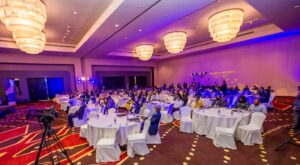- …as unemployment rate to hit 4.6% by end of 2021
Director-General of the State Interest and Governance Authority (SIGA), Stephen Asamoah Boateng, has called on leadership of the various state-owned enterprises to step-up their game and lead government’s efforts to solve the country’s graduate unemployment challenge.
Ghana’s unemployment rate is expected to hit 4.60 percent by the end of 2021, according to the Trading Economics global macro models and analysts.
Acknowledging the potential security challenges rising unemployment poses to the country, Mr. Boateng told B&FT that he expects the state-owned enterprises to play a crucial role in creating jobs for the country’s teeming unemployed graduates.

He, therefore, proposed the development of bespoke interventions which would link the supply chains of state enterprises to the Ghanaian small scale businesses sector. “We need to develop the state enterprises…to lead the job creation agenda,” Mr. Boateng emphasised during his interaction with B&FT on the sidelines of the 2021 Board/CEO/CAE Governance workshop in Accra.
The workshop was organised by the Institute of Internal Auditors, an international professional association with global headquarters in Florida, USA. It was themed ‘Leadership; Imperative for Institutional Survival’.
Mr. Boateng was one of the speakers at the workshop and spoke extensively on the theme, saying effective leadership is critical in the sustainable growth, success and survival of any institution.
According to him, leadership is the driving force behind successful businesses and entrepreneurs, and that to develop vital and viable organisations “leadership is essential to generating a new vision of what organisations can be, and urging the organisation to shift to the right direction.”
“Multiple audit reports from the Auditor-General…as well as detailed examinations of the global financial crisis and the recent issues which came up in Ghana concerning the collapse of banks all point to leadership flaws. We hear words like…mismanagement, corruption and financial misappropriation in our internal audit reports – and it all boils down to leadership that is not focused and delivering what the nation needs in both the private and public sectors,” he stated.
Mr. Boateng encouraged heads of institutions to be amenable to change, saying: “We cannot do business as usual in Ghana, otherwise nothing will happen. Change is the only constant thing in life. Nothing stays forever. The change is happening daily”.
The institute, as part of its programme, each year holds a Governance Forum that brings seasoned players in the Three Lines Model to discuss critical issues driving the corporate governance agenda. Due to the global pandemic, it was unable to have its Annual National Conference and Board/CEO/CAE Workshop in 2020.
The Institute’s president, Harriet Akua Karikari, however expressed hope that resumption of the workshop after a year’s break will provide a unique experience to participants as well as glean new perspectives on governance from experienced CEOS.
Describing the workshop’s theme as apt and timely, because “We have been hit by a global pandemic that has significantly changed our organisations and how they are governed”, she said the urgent need to redefine the role and search for critical and strategic leaders who will ensure survival and growth of organisations in these uncertain times into the future has never been greater.
“This workshop has set the stage for corporate governance experts to share their invaluable, cutting-edge and contemporary experiences which will determine how we navigate the turbulence and scale new heights for organisational survival and progress,” she said.










